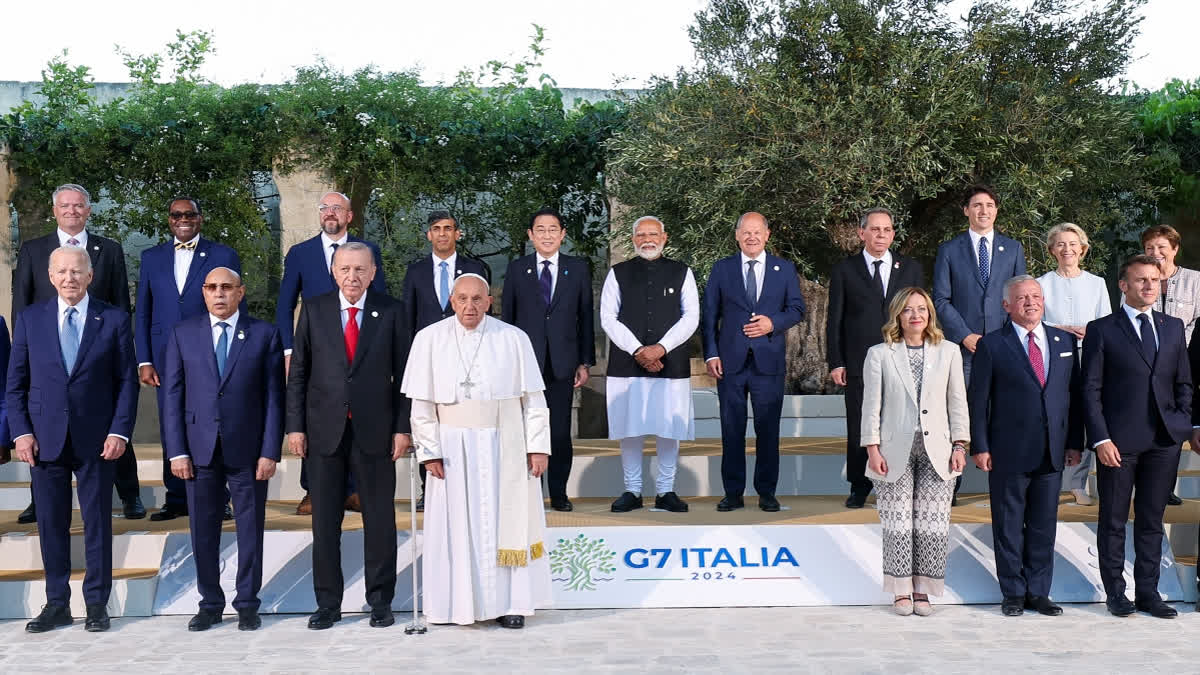Prime Minister Narendra Modi’s third term commenced with quick decisions on domestic and international fronts. By inviting leaders from South Asian countries, he indicated that there would be continuity in his proactive foreign policy. Within a few days after swearing-in, PM Modi travelled to Apulia in Italy to participate in the G7 meeting, which was his first international visit after being elected for a third term. India's participation at the G7 was all about engaging the developed Western countries, reiterating the rise of India as an important economic power and articulating the concerns of the global south.
G7 and India
The G7 summit in Italy had a special significance as it was also the 50th anniversary of the grouping. The G7 was conceived during the Cold War, and consequently, the major liberal democratic economies of that time were included as members. Even today, the composition of the G7 has remained the same, with the United States, Canada, France, Germany, Italy, Japan, and the United Kingdom as members.
While India is one of the top five economies in the world, it is not a member of the G7, as it is still considered a developing country. In recent years, India’s economy has registered impressive growth. It is the world’s largest democracy and is critical to maintaining stability in the multipolar world order. Consequently, India is often invited to the G7 as an 'Outreach Country' even though it is not a full member. Thus far, India has participated in 11 G7 Summits, and Prime Minister Modi has participated in about five consecutive meetings. India has growing economic and trade relations with many G7 countries, so it is vital that Delhi interacts with these countries at bilateral and multilateral platforms.
On the sidelines of the G7 summit, Prime Minister Modi had a series of fruitful interactions with many world leaders, such as US President Joe Biden, German Chancellor Olaf Scholz and French President Emmanuel Macron. The Indian and Italian prime ministers called for improved bilateral economic relations in the domains of 'clean energy, manufacturing, space, and telecom.'
With Japan’s Prime Minister Fumio Kishida, PM Modi exchanged views on a Special Strategic Global Partnership. They also discussed projects such as the Mumbai-Ahmedabad high-speed railway project. Modi also interacted with British Prime Minister Rishi Sunak. It should be noted that India and the UK are in an advanced stage of negotiations on a bilateral free trade agreement.
For the United Kingdom, after it withdrew from the European Union, enhanced economic engagement with emerging economies such as India has assumed significant importance. Both prime ministers took stock of the free trade agreement, which is in an advanced stage of negotiations. Prime Minister Modi’s interactions with Pope Francis caught the attention of many. PM Modi and Pope Francis hugged each other, and they had a brief light-hearted conversation. The Indian prime minister invited Pope Francis to visit India.
The Prime Minister utilised the G7 platform to showcase the strength of Indian democracy and the extraordinary arrangements which were made to successfully complete the recent elections in the country. Some of the G7 countries, such as France, the UK, and the US, are heading for elections this year. The US President and UK Prime Minister are in their first term and are facing severe anti-incumbency. On the other hand, the Indian Prime Minister was elected to office for a third term. At the Summit, Prime Minister Modi noted that the results of the Indian elections constituted the "victory of the entire democratic world."
China and Conflicts
